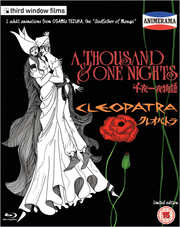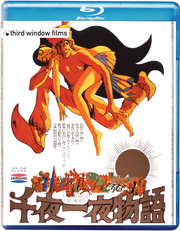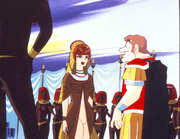Review for Animerama: 1001 Nights / Cleopatra Limited Edition
Introduction
For someone renowned as the father of anime and manga, Osamu Tezuka’s back catalogue is sorely missed from UK shop and e-tailer shelves. He was successful and he was prolific, yet in the UK all we’ve really seen is Astroboy and the Metropolis feature film, the latter made after his death. There’s something to be said for the market. When Tezuka was producing, anime was still mostly considered something for younger audiences, and those shows usually don’t date too well. At the end of the sixties, Tezuka wanted to open up the scope of anime to adult audiences as well, and so he came up with the idea of Animerama, feature films for adults, telling stories that were definitely not for children. It was a poorly timed venture with his studio Mushi Pro in decline; he’d left before the production of the third in the Animerama trilogy to start up another studio. Belladonna of Sadness was released last year in the UK by Anime Limited, a dark psychosexual drama that wore its politics on its sleeve.
Now, Third Window Films are releasing the first two films from the Animerama trilogy on Blu-ray, the two that actually came from the pen of Osamu Tezuka. My concern is that I may already have been spoiled by Belladonna of Sadness, as these two earlier films are completely different in style and tone.
The images in this review were kindly supplied by Third Window Films.
Introduction: A Thousand and One Nights
A young water seller named Aldin strides confidently out of the desert towards Baghdad. He’s a bit of a Jack the Lad, living by his wits, and selling his water, he thinks he’s got enough to spend at the slave market. But his 1 gold piece is nothing compared to the thousands that others spend. But then he falls in love with a slave girl named Milliam. What else can he do but run off with her when a whirlwind strikes, finding a provocative boudoir to spend the night. Fortunately their affections are mutual. But, Milliam’s original purchaser wants his property. That’s how Aldin winds up being tortured in a dungeon. Yet a sympathetic prison guard helps him escape. And so begins a fantastic adventure as Aldin travels the world led by his libido, always aiming to return to Baghdad and Milliam.
Picture: A Thousand and One Nights
A Thousand and One Nights gets a 2.35:1 widescreen 1080p transfer on this disc. The image is clear and sharp, the transfer excellent with no sign of aliasing or compression. The only flaws might be in the source, and while the film has cleaned up well, it’s not free of the odd scratch or fleck of print damage, has a bit of wobble to it, and dark detail can be lacking (ever a problem with traditional cel and paint anime). The film is a curious blend of traditional 2D animation, live action and model work, and the animation makes the most of a limited colour palette. The opening sequence for example is an expressive statement all in monochrome, as Aldin comes striding out of the desert in time to a funky beat.
Sound: A Thousand and One Nights
The sole audio track is a DTS-HD MA 2.0 Stereo Japanese track, although it sounds pretty front focussed and centralised for the most part. You have the choice between English and German subtitles. The dialogue is clear and the music and action comes across well, with no problems with glitches and dropouts. The subtitles are accurately timed, but could have used another proofreading, with more than a few typos, missing words, and some awkward phrasing. It’s never less than legible, and you always get the meaning, but they should have been better, including some of the character names (surely Aldin should have been Aladdin?)
Extras: A Thousand and One Nights
You have the choice between English and German animated menus on this disc.
On the disc is the theatrical trailer, which runs to 4:25 HD.
You’ll also find the interview with the films’ director Eiichi Yamamoto which runs to 53:16, also in HD. It’s a very useful interview which while it focuses on A Thousand and One Nights, also looks at his collaborative career with Tezuka, and the other films in the Animerama trilogy.
Finally there is the audio commentary from Helen McCarthy, author of The Art of Osamu Tezuka: God of Manga, and co-author of The Anime Encyclopaedia alongside Jonathan Clements. If there is one thing to look out for on an anime release, it’s a commentary from either of these two scholars, as they are both erudite and informed. Helen McCarthy’s commentary on this film is essential.
Conclusion: A Thousand and One Nights
Tezuka does the Arabian Nights story and gives it lashings of sex, a story driven by Aldin’s libido. He’s a proper Del Boy at the start of the film, living it large and getting by on his wit and charm. Why else would the slave girl he tried to buy with his meagre savings also fall for him, after he breaks her out and they go on the run? He lays on the charm and it isn’t long before they’re having a metaphor for sex. This may have been an X rated movie at one time, but its biggest sin is topless females and plenty of visual metaphors for the sexual act. The character designs are stylised enough to be suitably unrealistic, and with Tezuka’s preponderance of sight gags and jokes seasoning the drama of the narrative, this isn’t a film as provocative as Belladonna of Sadness.
The adventures of Aldin begin when he and Milliam are recaptured, she’s returned to her new owner, and he winds up in that dungeon that he escapes from. His initial instinct is for revenge, but seeing the folly of that, he goes after the thieves that his ‘foe’ hired to retrieve Milliam. That leads him to a certain cave belonging to 40 thieves. He has the chance to grab a bag load of stolen treasure but he winds up picking up the daughter of the bandit chief instead, as well as a magical flying horse.
That’s a short lived dalliance until they’re captured by an island of sirens. While Madia wants to leave, Aldin is more than happy to stay on an island populated by gorgeous women who are immediately devoted to him. Of course these women aren’t what they seem, but during his escape Aldin finds an abandoned ship haunted by a generous spirit that grants his every wish. By the time he’ll get back to Baghdad, he’ll literally be a different man, in a position to buy his retribution. Things don’t go according to his plans though, as the story heads towards an unexpected Oldboy ending.
A Thousand and One Nights is a fast-paced, entertaining, even jaunty story, which works for the most part, interleaving moments of drama with little comedic asides, while the episodic nature of Aldin’s adventures serves the story well. It’s just in the final act that it loses its way, with a curious change in Aldin’s character fuelling the story’s descent in a dark and unsettling direction, the mania of a despot now at odds with the preponderance of sight gags and quips. A Thousand and One Nights is an adult movie that can’t let go of childish concerns.
6/10
Introduction: Cleopatra
Cleopatra is famous for many things, the last Pharaoh Queen of Egypt, her love affairs with Caesar and Mark Antony, her fabled beauty, and of course how she died. That fame lasts through the millennia, so that when in the distant future, mankind faces a threat from an alien planet, a secret plan named after the ancient Egyptian queen, a plan is hatched to send three operatives back through time to live in the era of Cleopatra, to find some clue as to what that plan might be. These time travellers arrive just as the armies of Julius Caesar are marching on Alexandria, the throne of Pharaoh Ptolemy in their sights, and with the defenders of Egypt coming up with a desperate plan to stop the Roman Eagle...
Picture: Cleopatra
Cleopatra gets a 2.35:1 widescreen 1080p transfer on this disc, and just like A Thousand and One Nights, it’s a case of a fine transfer although the source could have been better. The image is clear and sharp, there’s no aliasing, and not much in the way of digital banding either. The animation is very much of its time, although once again, it’s a blend of anime, live action, and model work (with faces animated over actor’s bodies at one point). Blacks certainly could have been deeper, there’s a bit of wobble to the print, and a few signs of age and minor print damage.
Sound: Cleopatra
The sole audio track once more is a DTS-HD MA 2.0 Stereo Japanese track, with optional English and German subtitles. The audio is clear, although there are a few pops on the soundtrack. It’s a mostly front and centre experience, although there is a smidge of separation. The subtitles are timed accurately and are free of typos, and certainly flow better than in 1001 Nights, although I did scratch my head at an odd translation choice at one point, the use of the term ‘bipolarism’ as in bipolar disorder. The first use was in the fifties, but it didn’t come into public usage until the nineties, which makes it an odd translation for a film from 1970, where ‘manic depression’ may have been more appropriate.
Extras: Cleopatra
Once again you have the choice of English and German animated menus.
Once more, you have the film’s trailer (3:58 HD), and you have the essential audio commentary from Helen McCarthy. The commentary isn’t subtitled in English or German.
Conclusion: Cleopatra
I found Cleopatra to be more of a disappointment. It lacks that loose, flowing style of A Thousand and One Nights, the characters aren’t as vivid, and unlike the previous film’s air of fantasy, Cleopatra sets itself up with conforming to known history. That’s despite a framing device that uses some Quantum Leap gimmickry to send its future observers into the past, a framing device that is wholly misplaced, and really quite unnecessary, except as an explanation for all of the anachronisms, sight gags, references and jokes in the film.
Caesar’s armies invade Egypt, and overwhelmed, it’s decided that the best weapon the Egyptians have against the ambitious man is a beautiful woman. Alas, Cleopatra isn’t a beautiful woman, not until she has some Ancient Egyptian plastic surgery, but soon she’s at home in Caesar’s bed, looking for the right moment to assassinate him. The problem is that her feelings keep getting in the way, a character trait that persists through the film, as she travels to Rome, meets Mark Antony, and so on and so forth, until that fateful encounter with the asp.
If you’re keeping track, there’s even less in the way of sex in this film than there was in A Thousand and One Nights, and once more it’s of the metaphorical type that is accomplished through suggestion rather than anything explicit. It’s the preponderance of gags that leaves Cleopatra such a lightweight affair, which would be all well and good, except that I just didn’t find the film all that funny, less so than A Thousand and One Nights.
The sixties and seventies has a preponderance of these swords and sandals movies, not least of which was the Cleopatra movie itself with Richard Burton and Elizabeth Taylor. That sparked something of a brief obsession with the era and the Egyptian Queen. When it came to saucy comedies, we had Carry On Cleo, Up Pompeii, and when it comes to more family friendly animation, Asterix and Cleopatra predates this film by two years. Tezuka’s Cleopatra isn’t the first film that springs to mind when I think about the subject matter.
5/10
In Summary
I really was spoiled by Belladonna of Sadness in the end. It’s a film that eschewed Tezuka’s preponderance of in-jokes and sight gags to instead tell a meaningful, dramatic story, while the change in art style to something more ethereal and imaginative (predicated by budget), made the sexual content far more erotic and affecting. A Thousand and One Nights at least has a sense of style and ease, has a cast of more vivid characters that holds the attention. Cleopatra on the other hand lacks even this much, and has sci-fi overtones only serving as a distraction. I found both films’ sense of humour to be off-putting, and I didn’t really enjoy them that much. However, in this case, entertainment value is just one factor to consider. These films have a historical context which is just as important; their place in the pantheon of the animation gods, as works by Osamu Tezuka makes these films worthy of consideration. That context is made clear by the liner notes that these films receive from Simon Abrams, well worth reading, and the excellent audio commentaries from Helen McCarthy.



















































Your Opinions and Comments
Be the first to post a comment!